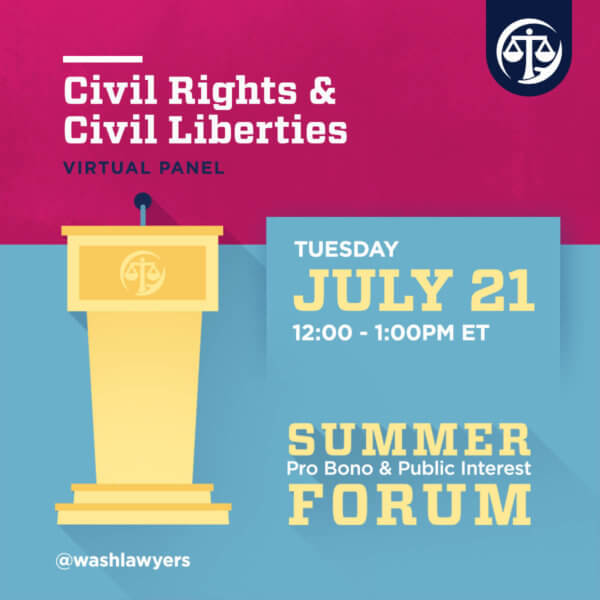
2020 Summer Forum Civil Rights & Civil Liberties Panel
by Nefertari Elshiekh
This week we hosted the much-anticipated Civil Rights & Civil Liberties Panel on July 21st. As our panel noted, this is a moment of great promise and great peril. We have an opportunity to spur real change, but we must seize the moment. Our experts delivered on concrete ways to do just that. Our expert panelists included:
- Sasha Buchert, Lamda Legal
- Fatima Goss Graves, National Women’s Law Center
- Jonathan Smith, Washington Lawyers’ Committee for Civil Rights and Urban Affairs
- Hassan Zavareei, Tycko & Zavareei LLP
The panel was moderated by Brandy Wagstaff, Legal Counsel for Litigation in the Criminal Section’s Human Trafficking Prosecution Unit at the U.S. Department of Justice.
Hassan started off by describing how he started his own firm, alongside his partner, while he was working on a pro bono case with the Washington Lawyers’ Committee for Civil Rights and Urban Affairs. He realized that there was a lot of public-interest work that could also be done by private law firms, enabling those who have an interest in public-interest work to do it in the private law firm setting.
The panelists focused most of their discussion on the impact of current events on the civil rights field, including the COVID-19 pandemic and the heightened interest in racial justice issues. Jonathan underscored that the last few months have been “extraordinary,” not because of anything new, but because “it has lifted to the surface the injustice and inequity that has existed in very profound ways since the founding of this country.” However, he went on to highlight that this has provided a unique opportunity to move the racial justice movement forward and achieve some of the goals that people have been fighting for for years.
Fatima echoed this by talking about how in movement work sometimes there are “acceleration points” like we are seeing now in society, but that doesn’t mean work wasn’t being done before. In fact, when working in the civil rights field, you do this work in an ongoing way; when an opening arises, your task is to “pry the window open further,” so that as much progress as possible can be made while you have people’s attention.
The panelists also touched on the intersectionality of law. Sasha emphasized the importance of an “intersectional composition of people” that are involved in discussions surrounding civil rights and in moving the work forward so that all these different groups and identities are reflected in the work. It is also crucial to listen to others to make sure that these voices are well-represented within the organizations involved in effecting change.
Jonathan added on to this by talking about how the “law is profoundly not intersectional.” He passionately reminded the audience that movement lawyers should think of the law as a tool that can help achieve certain things, but the law alone won’t necessarily be able to accomplish all of the movement’s goals.
Despite compounded problems in society right now, all of the panelists looked toward the future with hope. Hassan urged those that are part of firms, but have a passion for policy work, to devote time to non-profit organizations. He added, most big firms have opportunities for associates to be involved in such work. It may not always be right in front of you, and it may require you to put in some work, but “find what gets you up in the morning” and “follow your heart.”
What do you think? Join the Summer Forum conversation on social media using #SumFo20.
Nefertari Elshiekh is the 2020 Washington Council of Lawyers Summer Intern.






